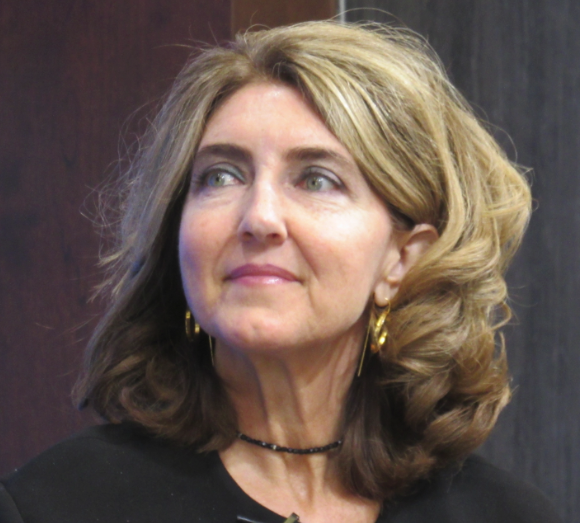
Q&A: Native News Online Talks to Tribal Casino Authority on Impact of Closures
“There’s going to be a heightened sense of distinction between tribal casinos and corporate casinos.”

Dr. Kate Spilde
Published March 26, 2020
PALM SPRINGS, Calif. — Within the past two weeks, virtually all tribal casinos have voluntarily closed their doors to help reduce the spread of the deadly COVID-19 (novel coronavirus). Tribal leaders cited the closures were for the well-being of their staffs, tribal community citizens and the general public.
Katherine (Kate) Spilde, Ph.D., teaches the tribal casino management and tribal gaming courses at San Diego State University and the Sycuan Institute’s research and service agenda based at the university.
A leading authority on tribal casinos, Spilde spoke with Native News Online by telephone on Monday to discuss the temporary closures of tribal casinos and their impact on Indian Country.
What are the impacts you see of tribal casinos closing down to stop the spread of the coronavirus?
I teach casino operations, with an eye to prepare students, and I am going to have to change how I teach — at least for the next two years.
How so?
First of all, I am going to reach out in a survey to determine what the tribes think I need to redirect for my class. In the meantime, I think there is the big picture perspective, there are going to be long-term ramifications beyond just the financial. I think there will be cultural ramifications.
One of them will be that there’s going to be a heightened sense of distinction between tribal casinos and corporate casinos. I think those differences will become more pronounced rather than less, as these two industries come to terms with these closures and what they mean.
Talk to us about some of those distinctions.
Our casino properties themselves, the buildings—the spaces—are the hub of more than just commercial life. Unlike the commercial casinos in Las Vegas, they’re not just businesses. They’re the hub of community life. Tribal casinos are where we have our high school reunions, weddings, birthday parties. We gather there.
Closing them has had a community impact, which will bounce back. There is a real interdependence that takes there more than just a commercial hub.
I remember staying at the Mohegan Sun in 2003. I was there for research purposes, and overnight, the U.S. went to war. I went downstairs for breakfast and the casino was packed. It was packed because people wanted to be together. These were not just tribal members. There were Connecticut people there from the public. People come together in times of difficulty. That is why this crisis is so different. We are being asked to stay apart.
What are some of the other ways that the business models differ between tribal casinos and commercial casinos?
In Las Vegas, they are really just businesses.
Tribal governments, as business owners of their casinos, on the other hand, have had to maintain a balance. That balance is “return on investment” versus “return on community.”
The focus on return on community — ROC — is that the money raised in casinos is specifically the revenue that is plowed into our communities. Now, the revenue is going down as a result of the closures. There will be fewer dollars in the short run, but need will still be there. The need for housing, health care, senior, education. The return on community will become more important to tribes.
And for some tribes, that community extends to other tribal communities, right?
In California, the tribes with casinos participate in a revenue-sharing program with tribes that don’t have casinos. Those dollars will be reduced as well.
How sustainable is it for tribes to keep paying for employees during the tribal casino shutdowns?
No one really knows. One thing I know is tribes tend to be conservative with their funds. You hear them talking about doing things for the next seven generations. So with that in mind, I think some tribes may have some reserves because they think in terms of the community, unlike the commercial casinos.
When you think about disasters, such as Katrina, or even here in California where there have been fires, they happen in geographic locations. In the past, tribes have been willing to provide aid when needed to other tribes. But, this is different, because the closures of the tribal casinos are all across the country. This is a much larger scale. Probably, no one place can help the other because it is so widespread.
None of these casinos, commercial or casino, have ever planned to be closed like this.
What have you been hearing about the inclusion of tribes into the Congressional relief package?
We have the former chairman, Jim Murren, of MGM going to the White House to advocate on behalf of MGM and the commercial casino industry. [Native casinos] have a trust relationship, a government-to-government relationship, which makes tribes different. This is an ongoing commitment from the federal government.
I’ve heard tribes articulate we’ve prepaid for our health care with the land base of this nation. We have prepaid for all these services, and we have not been tapping into them because many tribes have had gaming and have been paying on their own for these services. But that does not mean the right to those services doesn’t remain.
This is a difference that I think will have to be highlighted in the future.
The post Q&A: Native News Online Talks to Tribal Casino Authority on Impact of Closures appeared first on Native News Online.
